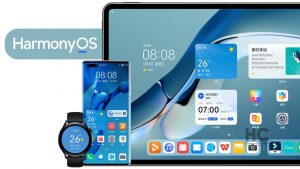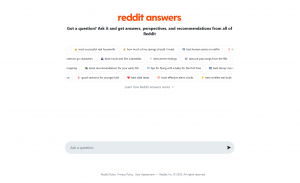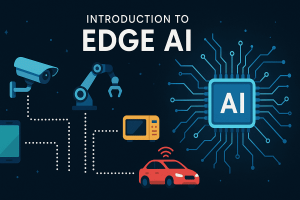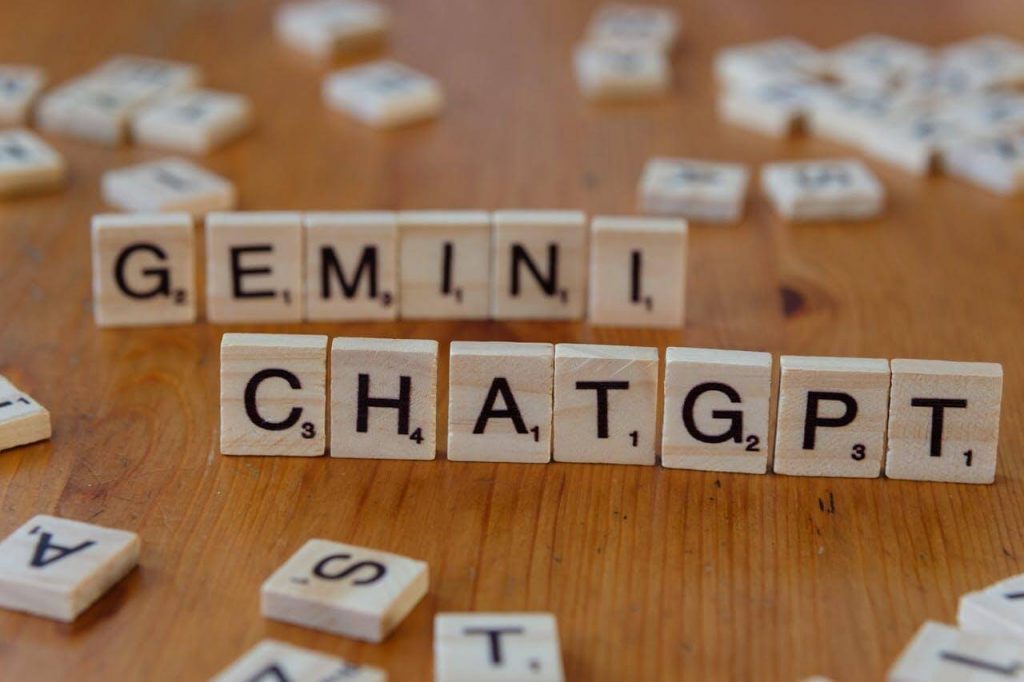
The AI revolution is in full swing, and two titans dominate the landscape: Gemini and ChatGPT. Both models represent the cutting edge of artificial intelligence, yet they cater to different strengths. Whether you’re a developer, researcher, marketer, or just AI-curious being able to choose between these two AI powerhouses matters.
But how do you decide?
Gemini, born from Google’s deep research in natural language processing, excels in multimodal reasoning, technical accuracy, and seamless Google Workspace integration. Meanwhile, ChatGPT, OpenAI’s flagship conversational AI, remains the king of creativity, coding assistance, and real-time collaboration.
This isn’t just a battle of specs; it’s about which AI fits your workflow. Do you need an analytical powerhouse for data-driven tasks, or a versatile creative partner for writing and ideation?
In this comprehensive Gemini vs. ChatGPT comparison, we’ll break down several aspects of each model so you know exactly which AI aligns with your goals. Let’s dive in!
AI Evolution: Gemini vs. ChatGPT
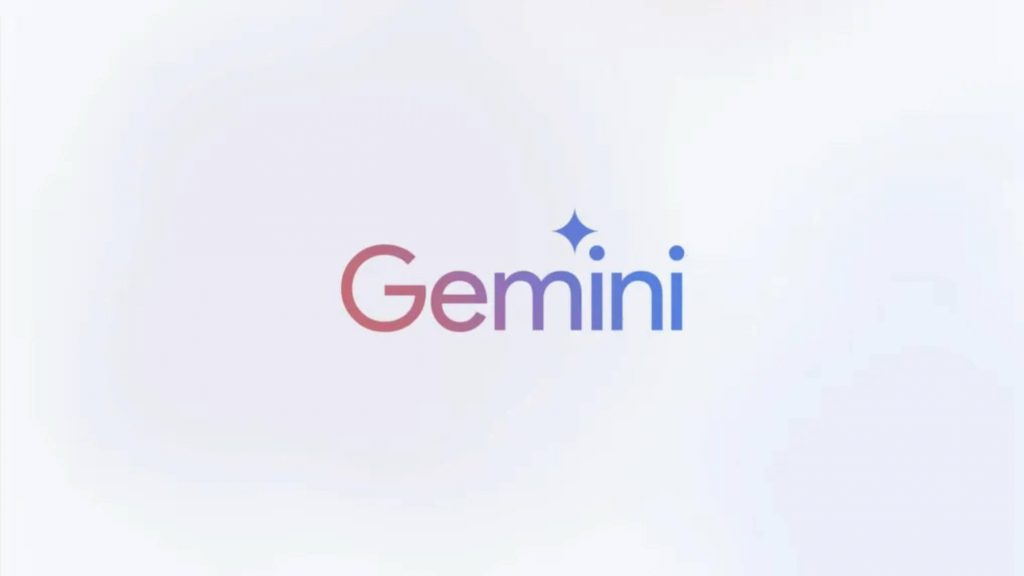
Gemini: Google’s AI Powerhouse
Gemini evolved from Google’s earlier work on conversational AI, originally introduced to the public as Bard. Initially focused on text-based interactions, it quickly advanced with the introduction of native multimodal capabilities—enabling it to understand and generate text, images, and other media in a unified way. This rebranding to Gemini marked a major shift in Google’s approach to enterprise-grade AI.
The launch of the Gemini 1.0 Ultra model signaled Google’s entry into high-performance AI for business, emphasizing deep reasoning, advanced analysis, and seamless integration with Google Workspace. Since then, the Gemini family has expanded to suit different needs:
- Gemini 1.5 Pro: The standard-bearer with a 1-million-token context window, ideal for complex research and data analysis.
- Gemini 1.5 Flash: Optimized for high-speed, low-cost operations, perfect for scaling customer support or content generation.
- Gemini Nano: A lightweight, on-device model powering Pixel smartphones, enabling offline AI functionality.
- Gemini Advanced: A premium tier ($19.99/month) with enhanced coding assistance and creative tools, rivaling ChatGPT’s GPT-4o.
ChatGPT: OpenAI’s Revolutionary Conversationalist
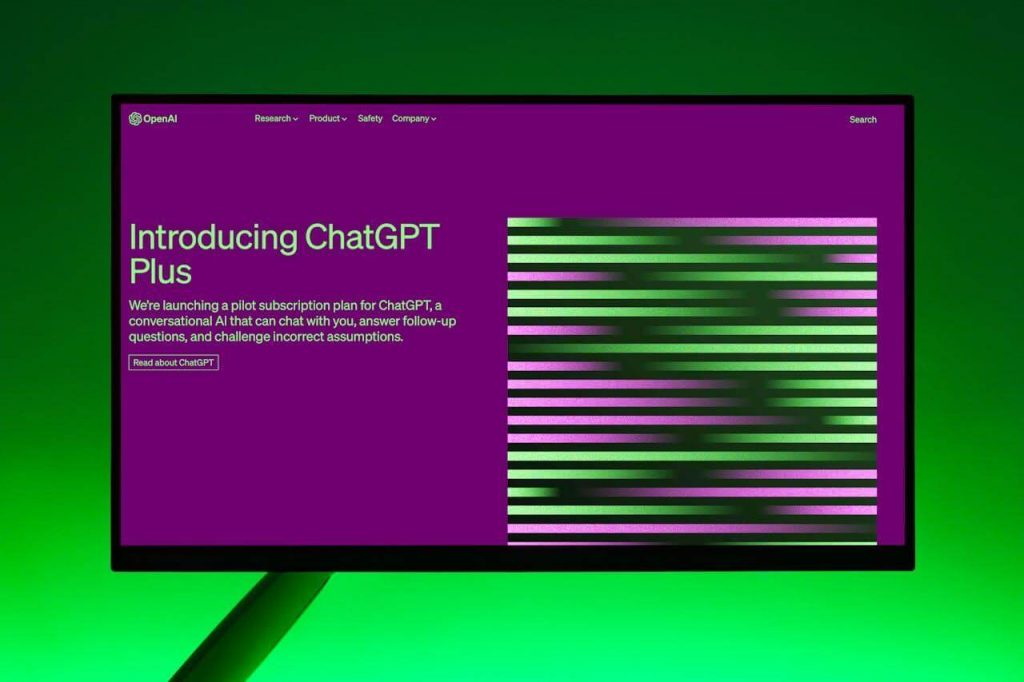
ChatGPT began as a public-facing version of OpenAI’s GPT-3, a model that captivated users with its ability to generate humanlike text. It quickly evolved from a novelty into a powerful productivity tool, gaining traction across industries for everything from writing assistance to coding support.
The introduction of GPT-4 brought significant improvements in reasoning and adaptability, setting a new standard for AI performance. Subsequent upgrades like GPT-4 Turbo enhanced speed and affordability, while GPT-4o introduced real-time voice, vision, and text capabilities—making interactions feel more fluid and natural than ever before.
- GPT-4o: The flagship multimodal model, excelling in dynamic conversations and creative tasks.
- GPT-4 Turbo: The cost-efficient workhorse for developers, balancing performance and affordability.
- Custom GPTs: User-tailored AI assistants for niche applications (e.g., legal drafting, coding tutors).
- ChatGPT Enterprise: A secure, admin-controlled solution for corporations, with advanced data governance.
Core Features: Gemini vs. ChatGPT

Multimodal Capabilities
Both Gemini and ChatGPT offer impressive multimodal features—but each leans into different strengths.
Feature | Gemini | ChatGPT |
Text | ✅ Excels in technical and research-heavy content | ✅ Strong conversational tone with creative fluency |
Images | ✅ Native image understanding (powered by Imagen 3) | ✅ DALL·E 3 integration for detailed visual generation |
Audio | ✅ Speech-to-text and synthesis in 40+ languages | ✅ Real-time voice (GPT-4o) with expressive, natural interactions |
Video | ⚠️ Limited to basic frame-by-frame analysis | ❌ No native video processing yet |
Code | ✅ Executes code and performs agentic debugging | ✅ Excels at code explanation, refactoring, and walkthroughs |
Reasoning & Accuracy
When it comes to reasoning and factual accuracy, Gemini distinguishes itself in technical domains. Its strength lies in long-chain reasoning tasks, such as solving complex mathematical problems or engaging in logical step-by-step deductions. Additionally, it demonstrates an impressive ability to handle translations and comprehension in low-resource languages like Swahili or Bengali. Because it can cross-reference its outputs with live Google Search, its answers tend to be more grounded in current, factual information, reducing hallucinations in knowledge-heavy fields.
ChatGPT, however, excels in nuance and synthesis. It’s more effective at summarizing dense academic material into digestible insights, and its creative writing capabilities are among the best in the AI space. Whether it’s drafting marketing copy, ideation, or telling coherent and engaging stories, the model typically produces more emotionally compelling outputs. In highly specialized technical domains like legal or medical queries, it tends to hallucinate less frequently—thanks to the refinements introduced in GPT-4 and GPT-4o.
Integration & Ecosystem
The choice between Gemini vs. ChatGPT often comes down to the platforms you already use. Gemini benefits from deep integration with Google’s productivity suite. Whether it’s auto-generating content in Docs, managing data in Sheets, or assisting with email in Gmail, it functions as a native extension of the Workspace ecosystem. For enterprise users working inside Google’s cloud infrastructure, it also connects to Vertex AI, enabling large-scale deployment and customized AI models.
ChatGPT, meanwhile, plays well with a broader range of third-party tools. Through its public API, users can build automations and workflows via platforms like Zapier, and even embed AI in collaborative environments like Slack. While its real-time data access is more restricted, premium users can access limited web browsing features. Custom GPTs also allow users to fine-tune behavior and style, building assistants tailored to specific business or personal needs.
Safety & Ethics
AI safety strategies vary significantly between Gemini and ChatGPT. Gemini takes a more conservative approach, filtering queries around sensitive topics such as politics and health. It also clearly labels AI-generated content when used inside Google Workspace, helping organizations remain transparent about how content is produced. This approach aligns with Google’s broader emphasis on enterprise trust and compliance.
ChatGPT allows for more open-ended interactions, granting users the ability to explore creative or controversial questions that might be blocked by Gemini. However, this flexibility comes with risks. GPT models have occasionally produced made-up citations or incorrect facts. To counter this, OpenAI offers a memory feature that gives users control over stored data, including the option to delete conversation history or prevent data retention altogether.
Use Case: Gemini vs. ChatGPT

Coding & Development
In the realm of software development, Gemini emerges as a self-sufficient powerhouse. Dubbed the “autonomous coder,” it excels in agentic coding—an approach where the model not only writes code but also detects and fixes its own errors across programming languages like Python and Java. Its standout feature is context retention. With the ability to handle over one million tokens, Gemini can manage sprawling codebases, making it especially valuable for refactoring outdated systems or maintaining enterprise-grade applications. According to internal benchmarks released by Google, Gemini successfully solved 82% of coding challenges, outperforming ChatGPT’s 76%.
ChatGPT, while slightly behind in autonomy, offers a different kind of strength: education and clarity. It specializes in breaking down complex algorithms into easy-to-understand explanations, complete with step-by-step reasoning. In terms of debugging, ChatGPT performs faster in real-time syntax correction—fixing errors 30% quicker than Gemini in a 2025 Stack Overflow study. What gives ChatGPT an additional edge is its thriving developer ecosystem. Integrations with VS Code, GitHub Copilot, and various plugins make it an excellent tool for collaborative coding environments.
Verdict: For solo developers or technical engineers seeking a tool that can work independently and scale across massive projects, Gemini is the top choice. For teams, learners, or anyone who values clear, pedagogical insight into their code, ChatGPT is the more supportive companion.
Academic Research
When it comes to academic and technical research, Gemini operates like a detail-obsessed analyst. It boasts a 15% higher precision rate in parsing complex STEM papers, according to a 2025 study published in Nature. Its strengths go beyond English—Gemini outperforms in translating research papers written in other languages, particularly in difficult language pairs like Chinese to English. One of its most valuable assets is its ability to cross-reference citations with Google Scholar, ensuring that sources are credible and up-to-date. This makes it an ideal assistant for academic researchers who need precision, integrity, and multilingual capability.
ChatGPT carves out its niche in summarization. When researchers need to get through volumes of academic literature quickly, ChatGPT shines by condensing dense papers into digestible summaries at twice the speed of Gemini. It is also tuned to reduce bias when summarizing controversial or politicized material—making it an asset for analysts who need neutral, objective output. However, its weakness lies in ultra-niche fields; for example, ChatGPT still struggles to parse advanced jargon in domains like quantum computing or theoretical linguistics, where Gemini holds an advantage.
Verdict: For deep dives into technical research and multilingual content, Gemini leads with accuracy and scholarly rigor. For conducting literature reviews or synthesizing research into executive summaries, ChatGPT’s speed and clarity make it the more efficient choice.
Creative Work
In creative applications, Gemini positions itself as a structured storyteller, especially where data and documentation intersect. Its ability to produce publication-ready charts and graphs through Imagen 2 makes it a valuable tool for creating visually compelling reports or dashboards. Furthermore, it excels in technical writing—generating clean, structured documentation that often requires minimal post-editing. Whether it’s an instruction manual or a research whitepaper, Gemini delivers consistency and clarity rooted in logic.
ChatGPT, meanwhile, is the clear leader in narrative and entertainment-focused content. Its scripts and written content consistently score higher in audience engagement metrics, with YouTube Creator Lab reporting a 22% bump in retention when content was generated or co-authored by ChatGPT. One of its greatest strengths is tonal versatility. It can move effortlessly between different writing styles, switching from Shakespearean drama to Gen Z internet slang within a single session. Combined with its integration with DALL·E 3, ChatGPT enables creators to develop not just compelling copy, but rich visual storytelling experiences as well.
Verdict: For content that revolves around structured information, technical clarity, or business storytelling, Gemini’s precision is unmatched. But for ads, scripts, marketing, and highly engaging multimedia content, ChatGPT continues to lead the creative charge.
Pricing: Gemini vs. ChatGPT

Plan | Price | Features | Best For |
Gemini Advanced | $19.99/month | Access to Gemini 1.5 Pro, Deep Research, 2TB Google One storage | Professionals using Google Workspace |
Gemini Business | From $20/month/seat (1-year) | Integrated AI across Gmail, Docs, Sheets; enterprise-grade security | Teams using Google apps extensively |
Gemini Enterprise | From $30/month/seat (1-year) | Full AI suite, enhanced meetings, document security | Large organizations and enterprises |
Gemini Freemium | Free | Access to Gemini 1.5 Flash and 2.0 Flash Experimental | Casual or first-time users |
ChatGPT Plus | $20/month | GPT-4o access, higher usage limits, priority feature access | Regular AI users |
ChatGPT Pro | $200/month | Unlimited access to advanced models, video/screen sharing, Sora video generation | Power users, researchers, content pros |
ChatGPT Free | Free | Limited GPT-4o and DALL-E 3 access, usage caps | Casual users or AI beginners |
For users who rely heavily on Google’s suite of tools and want advanced AI integration built into their existing workflow, Gemini Advanced is a practical and affordable option. Businesses looking for enhanced security and document control will benefit from the Business and Enterprise tiers, especially when deployed at scale.
On the other hand, those seeking a more general-purpose AI that excels in creative tasks, educational content, and coding support will find ChatGPT Plus to be a reliable and cost-effective choice. Meanwhile, ChatGPT Pro is best reserved for professionals and teams requiring high-frequency, multimedia-rich AI support.
Budget-conscious users can explore either free plan, though they should expect restrictions in speed, access, and output volume.
Final Verdict: Gemini vs. ChatGPT
If your work revolves around deep research, technical analysis, or complex data interpretation, Gemini stands out as the ideal choice. Its ability to parse academic papers with high precision, generate dynamic data visualizations, and integrate seamlessly with Google Workspace tools like Docs, Sheets, Gmail, and Calendar makes it a natural fit for researchers, analysts, and enterprise users. Whether you’re working on a thesis, preparing a detailed report, or collaborating across Google apps, Gemini offers a streamlined, research-focused AI experience.
On the other hand, GPT-powered models shine in creative and technical environments where storytelling, idea generation, or code debugging is essential. These models provide not only detailed and intuitive explanations for coding challenges but also excel at generating engaging scripts, marketing copy, and brainstorm-ready content. With a growing ecosystem of third-party plugins, ChatGPT adapts easily to a wide range of productivity and automation needs, making it a top choice for creatives, developers, and educators.
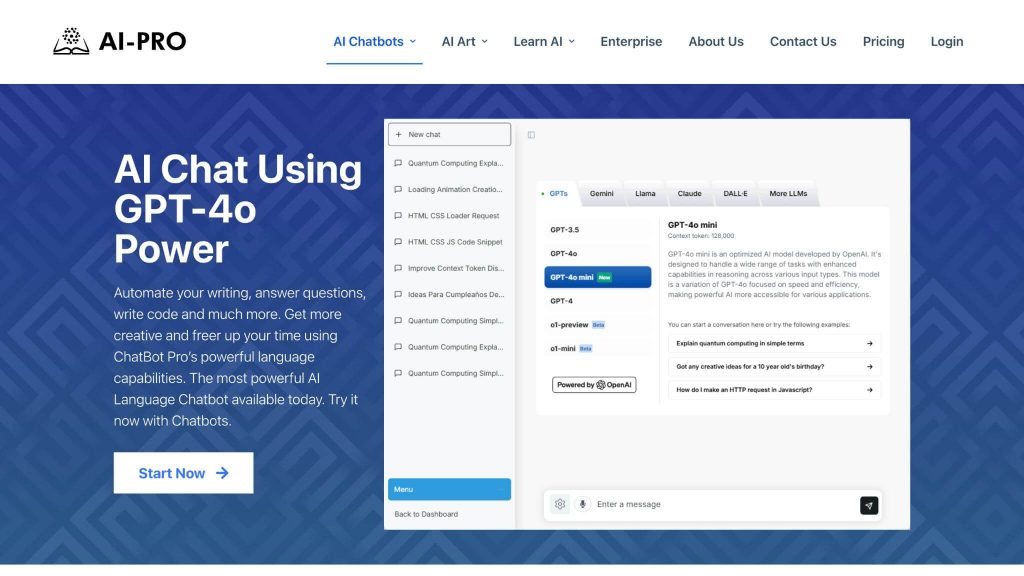
But if you’re someone who needs the strengths of both—research power, creative flexibility, and coding support—there’s no need to choose just one. AI-Pro’s ChatBot Pro combines the capabilities of both Gemini and GPT models into a single, unified platform. With ChatBot Pro, you can switch effortlessly between models depending on your task, access premium features without managing multiple subscriptions, and work smarter across research, business, and creative domains—all in one place.
Try ChatBot Pro today and experience next-gen AI flexibility in action!

